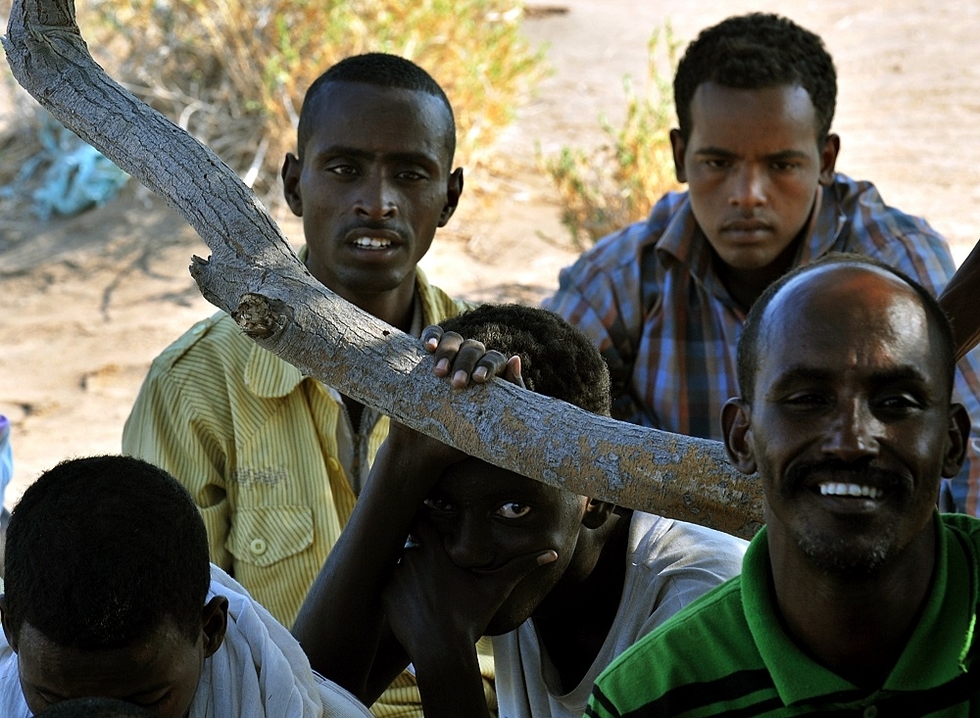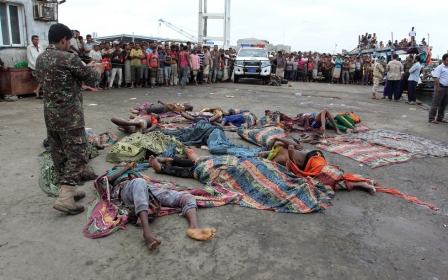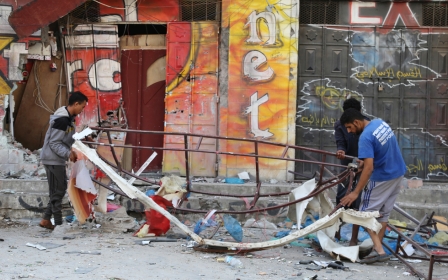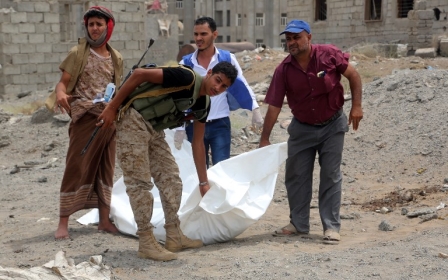Destination Yemen: Migrant arrivals soar despite war, famine and sickness

SANAA - Abdullah Ibrahim travelled through his own battle-scarred country of Somalia to reach Djibouti, handed over all his money to a smuggler and spent three days crammed in a boat to cross to Aden in Yemen, swimming the last few miles to avoid capture by coast guards. On reaching land, with no money left and little food, a 350 km trek across a foreign land to Sanaa awaited.
He made it to the Yemeni capital two weeks later. And he considers himself one of the lucky ones.
"Some people were killed by smugglers in front of my eyes. We had to pay money for smugglers and those who did not have money, they risked their lives," the 25-year-old told Middle East Eye of his 2014 journey.
Some people were killed by smugglers in front of my eyes. We had to pay money and those who did not have any, they risked their lives
- Abdullah Ibrahim, Somali
"I also heard about the people who died when their boats sank - but I am a good swimmer, so I had no fear."
Ibrahim's story is but one of the tens of thousands told every year by migrants fleeing to Yemen from the Horn of Africa. And while Ibrahim's journey started before the war, waves of refugees continue to land on the shores of Yemen.
A total of 111,504 people are estimated to have arrived in Yemen in 2016, surpassing the previous peak of 107,532 in 2012, according to Reliefweb, the UN humanitarian office's digital information service. The vast majority come from Ethiopia, but Somalis also arrive in their thousands.
But what they find, just like Ibrahim, is far from the hope they had of a new life.
Ibrahim recalled: "When I arrived Aden, there was no money with me, I paid all my money to the smuggler, and I needed to get to friends in Sanaa.
"There was no way to get to Sanaa but to walk on foot. I found some refugees want to go to Sanaa, so we walked as one group from Aden to Sanaa."
He walked for 15 days to get to the capital and found work as a cleaner, the work of many who have followed his route, and earns a paltry $78 a month.
"My family is in Somalia but I cannot help them with money as I hardly pay for my livelihood in Yemen. This is not great work but it is better than Somalia."
Forced onto the margins
The movement of such large numbers of people has had a knock-on effect for Yemenis already facing destitution due to a failed economy and the ongoing effects of war. Before 2015, almost half of Yemenis lived below the poverty line, two-thirds of youths were unemployed. Food insecurity is rife, as are diseases such as cholera.
And Yemenis, facing such conditions, now compete with more Somalis and Ethiopians, who are prepared to work for less. And employers even prefer them.
Moharam Noaman is one Yemeni who says he can no longer find work as a result.
"I am willing to work in any job - even cleaning - but when I try to look for one, I am shocked to see Yemenis prefer Somalis to Yemenis," the 36-year-old said.
"I was even willing to work for the same money as the Somalis but Yemenis decline, stating that I do not have the same experience.
"Life in Yemen is getting worse, so we have to leave Yemen towards other countries looking for work."
That statement is backed up by the UNHCR, which said 190,352 Yemenis had left the country in 2017.
Abdullah al-Sharabi, a company manager in Sanaa, said he prefers Somali cleaners because they work for any money, are honest and have experience.
"I think most of the private institutions in Yemen, if not all, prefer Somali cleaners because they are honest, skilled and cheap.
"For me, I only hire Somalis as cleaners as Yemenis do not work with the same skill for the same money."
Onward journeys
Once inside Yemen, many migrants find it difficult - and dangerous - to leave, even if they want to. War has trapped them in the country, and leaving is often a deadly enterprise.
More than 40 Somalis were killed when a helicopter gunship attacked their boat off Yemen in March of last year, the United Nations refugee agency said, and Somalia called on the Saudi-led coalition fighting in the country to investigate.
Mohamed al-Alay, a coastguard officer in the Houthi-controlled province of Hodeidah, said the refugees, carrying official UNHCR documents, were going to Sudan from Yemen when an Apache helicopter attacked near the strategic Bab al-Mandab strait, according to Reuters.
The African refugees consider Yemen as a passage to Saudi Arabia, they remain in Yemen until they get the proper chance
- Fadhl al-Thobhani, Taiz university
"We do not know who carried it out but survivors said they came under attack from another boat. The crew used lights and shouted to signal this is a civilian boat," ICRC spokeswoman Iolanda Jaquemet said after the attack.
Shabia Mantoo, the UNHCR spokeswoman in Yemen, said the vessel was carrying 140 people and trying to sail north out of Yemen when it was hit. She said many of the estimated 255,000 Somali refugees in Yemen are trying to leave because of the war.
However, the flow to Yemen has increased despite this.
Ethiopians, the majority of arrivals, are still determined to make the crossing to Yemen. Not many intend to stay in Yemen though.
Almost all Ethiopian migrants express the intention to move onwards to Saudi Arabia, according to reliefweb.
Professor of sociology in Taiz university, Fadhl al-Thobhani, stated that the flow of African refugees is still ongoing to the war-torn country of Yemen because they are dreaming to reach Saudi Arabia.
"The African refugees consider Yemen as a passage to Saudi Arabia, so they are still arriving to Yemen and those who fail to reach Saudi, they remain in Yemen until they get the proper chance."
Ibrahim is one of them.
"Some of my friends have already left Yemen to Saudi Arabia and there they can earn excellent wages, so I am planning to travel but I need more than $1,000 to pay for a smuggler.
"Saudi Arabia is the dream of all refugees in Yemen."
New MEE newsletter: Jerusalem Dispatch
Sign up to get the latest insights and analysis on Israel-Palestine, alongside Turkey Unpacked and other MEE newsletters
Middle East Eye delivers independent and unrivalled coverage and analysis of the Middle East, North Africa and beyond. To learn more about republishing this content and the associated fees, please fill out this form. More about MEE can be found here.






